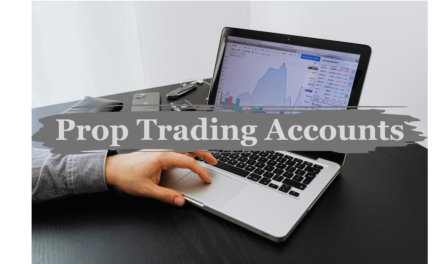Trading Titans: Unveiling the Powerhouse World of Proprietary Trading
Introduction: The Pulse of Financial Maverick Strategies
Proprietary trading, commonly known as prop trading, represents a fascinating and dynamic approach to financial markets that has captivated sophisticated investors and ambitious traders for decades. At its core, prop trading is a unique investment strategy where financial institutions or specialized firms trade their own capital to generate profits, rather than executing trades on behalf of clients. This revolutionary approach to market engagement has transformed how financial professionals approach investment and risk management.
The intricate world of prop trading goes far beyond traditional investment methodologies. By leveraging advanced technology, deep market insights, and sophisticated trading algorithms, prop traders create opportunities that transcend conventional trading limitations. Their ability to take calculated risks and generate substantial returns has made prop trading an intriguing and potentially lucrative career path for ambitious financial professionals.
What is Prop Trading? Decoding the Financial Enigma
Proprietary trading occurs when a financial institution, investment bank, or specialized trading firm uses its own money to conduct financial transactions with the primary goal of generating direct market profits. Unlike traditional brokerage models where firms earn commissions by executing client trades, prop trading involves deploying the firm’s capital directly into various financial instruments such as stocks, bonds, commodities, derivatives, and currencies.
The mechanics of prop trading are complex and multifaceted. Traders utilize advanced analytical tools, real-time market data, and sophisticated risk management strategies to make rapid, informed decisions. These professionals are typically highly skilled, possessing deep understanding of market dynamics, advanced mathematical skills, and the ability to make split-second judgments under high-pressure environments. Their success depends on their capacity to identify market inefficiencies and exploit them before competitors can react.
The Powerful Advantages of Prop Trading: Why Traders Are Drawn to This Model
One of the most compelling advantages of prop trading is the potential for significantly higher returns compared to traditional trading approaches. Since traders are using the firm’s capital, they can leverage larger positions and implement more aggressive trading strategies. This means the potential profit margins can be substantially higher than what individual investors might achieve through personal trading accounts.
Moreover, prop trading firms often provide traders with cutting-edge technological infrastructure, comprehensive training programs, and robust risk management frameworks. These resources enable traders to develop their skills, access sophisticated trading platforms, and receive continuous professional development. The collaborative environment within prop trading firms also allows for knowledge sharing and collective learning, creating a dynamic ecosystem of financial expertise.
Another significant advantage is the reduced personal financial risk. Unlike independent trading, where individuals must risk their own capital, prop traders operate with the firm’s resources. This structure allows traders to focus on strategy and execution without the psychological burden of potentially losing personal savings. Additionally, successful prop traders often receive performance-based compensation, creating a direct alignment between their skills and financial rewards.
Navigating the Challenges: Disadvantages of Prop Trading Unveiled
Despite its allure, prop trading is not without substantial challenges. The most notable disadvantage is the extremely high-pressure environment. Traders must consistently deliver exceptional performance, with little margin for error. One significant loss can potentially jeopardize their entire career, creating immense psychological stress and demanding unwavering mental fortitude.
Regulatory complexities also pose significant challenges in the prop trading landscape. Following the 2008 financial crisis, regulations like the Volcker Rule have imposed stricter limitations on proprietary trading by banks. These regulatory constraints have transformed the prop trading ecosystem, requiring firms to adapt their strategies and risk management approaches continually.
Furthermore, the technological arms race in prop trading means constant investment in advanced systems and talent is crucial. Firms must continuously upgrade their technological infrastructure, hire top-tier mathematical and computational experts, and develop increasingly sophisticated trading algorithms. This ongoing investment creates substantial overhead costs and increases the barrier to entry for smaller trading organizations.
The Future of Prop Trading: Emerging Trends and Technological Evolution
The prop trading landscape is rapidly transforming with the integration of artificial intelligence, machine learning, and quantum computing. These technological advancements are revolutionizing how trading strategies are developed and executed. Advanced algorithms can now process massive datasets, identify complex market patterns, and make trading decisions in microseconds.
Emerging markets and cryptocurrency platforms are also creating new opportunities for prop trading. The increased volatility and 24/7 trading environments in digital asset markets provide unique arbitrage opportunities that traditional financial markets cannot offer. Prop trading firms are increasingly diversifying their strategies to include these emerging asset classes, demonstrating the industry’s adaptability and forward-thinking approach.
Conclusion: Embracing the Prop Trading Paradigm
Proprietary trading represents a sophisticated, high-stakes approach to financial markets that combines technological innovation, deep market understanding, and calculated risk-taking. While the model offers tremendous opportunities for skilled professionals, success requires continuous learning, technological proficiency, and exceptional analytical capabilities.
As financial markets continue to evolve, prop trading will undoubtedly play a crucial role in shaping investment strategies and market dynamics. For ambitious traders willing to embrace complexity and maintain exceptional performance standards, prop trading offers an exhilarating and potentially highly rewarding career path.


